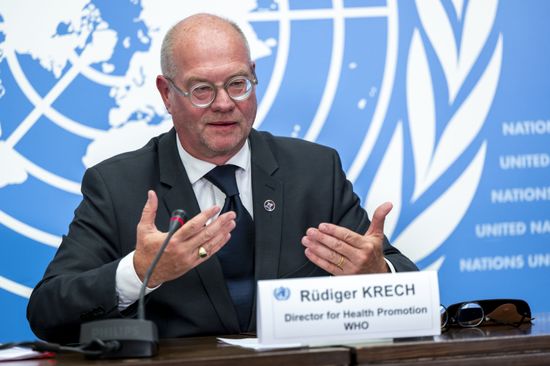Workers worldwide need better protection from extreme heat as climate change causes more frequent heatwaves – that's the conclusion of a new report from the World Health Organization and the World Meteorological Organization.
The report says millions of workers are exposed to heat stress, which affects their health and their performance. It calls for governments, employers, and workers to cooperate to develop adaptation strategies.
Although the WHO has warned many times of the health risks of extreme heat, this is its first report since 1969 specifically on heat stress at work.
The WHO's Director of Environment, Climate and Health, Rüdiger Krech says its findings should be a wake-up call.
"It is not just discomfort. It is a real health risk," he told the BBC. "If you're working in heat and your body temperature increases by, over a longer period, over 38C, then you are at risk of severe heat-related stress and stroke, kidney failure, dehydration."
Adaptation is needed because heatwaves are no longer rare occurrences. The World Meteorological Organization says the last decade has seen the warmest temperatures on record, with 2024 being the hottest year ever.
In parts of Europe, temperatures of 40C (104F) and more are now not unusual. In Africa or the Middle East, they can rise to 50C. Average surface temperatures in the Mediterranean in July were the warmest on record at 26.68C, according to Mercator.
This week the UK's Met Office said this summer was on track to be one of the warmest since records began in 1884.
Heatwaves do not just damage health, the WHO warns, they also affect output. The new report shows that for every one degree temperature rise above 20C, productivity falls by 2%.
Meanwhile, accidents increase. During Europe's heatwave of 2023, Switzerland's national accident insurance fund (Suva) estimated that when temperatures rose over 30C, workplace accidents rose by 7%.
The causes, Suva said, included concentration issues as workers' bodies struggled to adapt to extreme heat, and lack of sleep, again caused by the heat.
With construction and agricultural workers particularly at risk, some European countries are already looking at how they can adapt to make work safer during heatwaves.
Last month, the Italian government signed an emergency decree, after agreeing a protocol with unions and bosses to stop people having to work during the hottest hours of the day.
